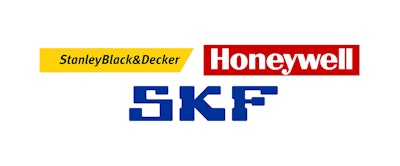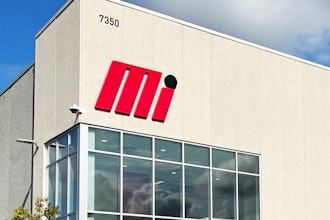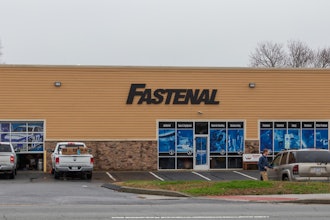
We're in the midst of another fiscal earnings reporting period, with many well-known industrial distributors and suppliers posting their latest quarterly performance. Here's a roundup of the key figures posted by Stanley Black & Decker, Honeywell and SKF.
Stanley Black & Decker
Sales continued to grow at a faster rate for Stanley Black & Decker in its 2017 second quarter. Total sales of $3.2 billion increased 10.1 percent year-over-year, while organic sales grew approximately seven percent. Those figures far outpace Q1's total and organic growth of 5 percent.
The company said the 10.1 percent overall growth was driven largely by an 8-percentage point increase in volume and 7-point increase from acquisitions, partially offset by divestitures (-3 percent), price (-1) and currency (-1).
Total company profit of $277.2 million increased from $271.5 million a year earlier. Q2 gross margin was 37.5 percent, and excluding charges was 38.3 percent — relatively flat year-over-year.
By business segment in Q2:
Tools & Storage sales of $2.26 billion jumped 17.0 percent year-over-year — with 11 percentage points of that growth due to acquisitions as the company's completed acquisitions of both Newell Tools and the Craftsman brand were incorporated for the first time. Volume contributed nine points to the growth, partially offset by divestitures (-1), price (-1) and currency (-1). Organic sales increased approximately 8 percent. Total profit of $374.3 million increased from $362.5 million a year earlier, while profit rate of 16.6 percent was down 1.5 points.
Industrial sales of $496 million increased 7.2 percent year-over-year, powered by a seven-point increase in volume. Engineered Fastening organic sales increased approximately 6 percent, while Infrastructure organic sales jumped approximately 19 percent. Total profit of $96.4 million jumped considerably from $78.8 million a year earlier, while profit rate of 19.4 percent was flat.
Security sales of $474 million were down 11.9 percent year-over-year, largely due to the company's recent divestment of its Mechanical Security business, which impacted sales by 14 percentage points. Likewise, total profit of $51.9 million was down from $67.7 million a year earlier, while profit rate of 11.1 percent was flat. North America organic sales increased 4 percent.
"Supplementing the solid organic performance, our recent acquisitions added seven points of revenue growth," Stanley B&D president and CEO James Loree said. "The integrations of both Newell Tools and the Craftsman brand are in full swing and on target. I am pleased with our team's solid execution, and with our continued efforts to become known as a leading innovator, deliver top-quartile financial performance and elevate our commitment to social responsibility."
For the full year, the company is expecting mid single-digit organic growth in Tools & Storage; low single-digit growth in security; and relatively flat in industrial.
Honeywell
Industrial conglomerate Honeywell reported 2017 Q2 total sales of $10.08 billion, up 0.9 percent year-over-year and beating Wall Street expectations of $9.83 billion. Organic sales improved approximately 3 percent. Total profit was $1.39 billion.
By business segment in Q2:
Aerospace sales of $3.67 billion decreased 2.9 percent year-over-year, while organic sales increased approximately 2 percent. Profit of $819 million improved from $719 million a year earlier, and operating margin increased 140 basis points to 22.3 percent. The company said organic sales growth was driven by strength in commercial aftermarket, growth in U.S. defense and a continuing recovery in commercial vehicles in transportation systems.
Home and Building Technologies sales of $2.74 billion increased 2.2 percent year-over-year, while organic sales increased approximately 4 percent. Profit of $420 million improved slightly from $412 million a year earlier, and operating margin of 15.4 percent was flat. The company said organic growth was driven by Smart Energy program roll-outs, air and water product sales in China and continued growth in the distribution business
Performance Materials and Technologies sales of $2.24 billion decreased 8.7 percent year-over-year, while organic sales increased approximately 6 percent. Profit of $524 million improved slightly from $520 million a year earlier, and operating margin increased 200 base points to 23.4 percent. The company said organic growth was driven by continued strength in Solstice sales in Advanced Materials and double-digit growth in modular gas processing in UOP.
Safety and Productivity Solutions sales of $1.10 billion soared 29.7 percent, though organic sales increased approximately only 1 percent. Profit of $214 million improved approximately 24 percent, and operating margin decreased 70 base points to 15.0 percent. The company said organic growth was driven by higher volumes in industrial safety products, sensing controls and voice-enabled workflow solutions.
The company raised its 2017 full year sales outlook from a previous $38.6-39.5 million to a current $39.3-40.0 million, and expects organic sales to post an incrase of 2-4 percent.
SKF
Sweden-based bearings maker SKF reported Q2 total sales of $2.45 billion, up 7.5 organically year-over-year. North American sales grew 10 percent, while Asia sales grew 12 percent.
The company said improved sales volumes and factory utilization rates contributed to an adjusted operating profit of $295 million.
"The second quarter saw strong organic growth and an improved operating margin. Sales development was positive in all regions, as underlying industrial activity and investments increased," said SKF president and CEO Alrik Danielson.
SKF's industrial business posted an adjusted operating margin of 13.8 percent, while the automotive business' was 8.1 percent.
"As we move into the second half of the year, we expect to see continued broad-based industrial activity and growth," SKF's Q2 earnings press release stated.
The company expects Q3 demand to be higher year-over-year, but down from Q2 2017.
"The demand for SKF’s products and services is expected to be lower for the group and industrial and slightly lower for automotive," SKF said. "Demand is expected to be significantly lower in Europe and relatively unchanged in North America, Asia and in Latin America."






















